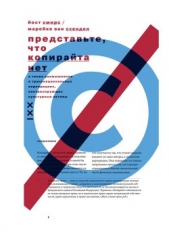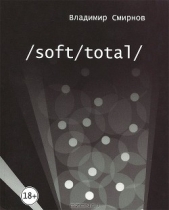Представьте, что копирайта нет. А также размышления о транснациональных корпорациях, контролирующих

Представьте, что копирайта нет. А также размышления о транснациональных корпорациях, контролирующих читать книгу онлайн
Нидерландские исследователи Йост Смирс и Марейке ван Схендел считают, что нынешние условия защиты авторского права несовместимы с принципами демократического общества. Эта "крайняя форма цензуры" не защищает авторов произведений, а служит, в первую очередь, гигантским корпорациям, которые с легкостью решают, что мы должны увидеть, услышать или прочесть. Осмысление этой проблемы, а также бесповоротный переход к цифровым технологиям должны полностью изменить порядок вещей, ослабить неоправданно жесткий контроль и чрезмерный поток денежных средств в области копирайта. Только тогда будет создана игровая площадка для равноправных партнеров - предпринимателей в сфере культуры и авторов произведений.
Внимание! Книга может содержать контент только для совершеннолетних. Для несовершеннолетних чтение данного контента СТРОГО ЗАПРЕЩЕНО! Если в книге присутствует наличие пропаганды ЛГБТ и другого, запрещенного контента - просьба написать на почту [email protected] для удаления материала
Frey B. S., Pommerehne W. W. Muses and Markets. Explorations in the Economics of the Arts. — Oxford: Basil Blackwell, 1989.
Frey B. S. Art & Economics. Analysis & Cultural Policy. — Berlin: Springer, 2000.
Frey B. S. Some considerations on fakes in art: an economic point of view. — In Mossetto, 2004. — P. 17-29.
Frith S. ( ed. ). Music and Copyright. — Edinburgh: Edinburgh University Press, 1993.
Frith S., Marshal L. (ed. ). Music and Copyright. — Second Edition. — Edinburgh: Edinburgh University Press, 2004.
Fukuyama F. Trust. The Social Virtues 8c the Creation of Prosperity. — New York: The Free Press, 1995.
Gagnon M.-A., Lexchin J. The Cost of Pushing Pills. A New Estimate of Pharmaceutical Expenditures in the United States. — In PloSMedicine, January, 2008, Vol. 5, Issue 1 (www.plosmedicine.org).
Geinser G., Wijnberg N. W. Effects of Reputational Sanctions on the Competitive Imitation of design Innovations. — In Organization Studies, 2001,22/4. —P.563-591.
Germann C. Content Industries and Cultural Diversity. The Case of Motion Pictures. — In Culturelink (Zagreb), Special Issue, 2002/2003. — P.97-140.
Gerven W. van, barouche R, Lever J. Cases, Materials and Texts on National, Supranational and International Tort Law. — Oxford: Hart Publishers, 2000.
Ginsburgh V.A., Throsby D. (eds.). Handbook of the Economics of Art and Culture. — Amsterdam: North-Holland, 2006.
Glenny M. McMaffia. Crime Without Frontiers. — London: The Bodley Head, 2008.
Goldstein P. International Copyright. Principles, Law and Practice. — Oxford: Oxford University Press, 2001.
Gowers A. Gowers Review of Intellectual Property. — London: HM Treasury, 2006.
Gräber, Beat C. a. o. (eds.). Digital Rights Management. The End of Collecting Societies? — Berne: Staempfli Publishers Ltd, 2005.
Grandstrand О. (ed.). Economics, Law and Intellectual Property. — Amsterdam: Kluwer Academic Publicers, 2003.
Grosheide W., BrinkhofJ. (eds.). Intellectual Property Law. Articles on Cultural Expressions and Indigenous Knowledge. — Antwerp: Intersentia, 2002.
Hagoort G. Cultural Entrepreneurship. — Utrecht: Eburon, 1993.
Harold C. OurSpace. Resisting the Corporate Control of Culture. — Minneapolis: University of Minnesota Press, 2007.
Hartley J. (ed.). Creative Industries. — Oxford: Blackwell, 2005.
Hauser. Sozialgeschichte der Kunst und Literatur. — München: C. H. Beck, 1972.
Heins M. «The Progress of Science and Useful Arts»: Why Copyright Today Threatens Intellectual Freedom. — New York: Brennan Center for Justice, 2003.
Heller A. The Power of Shame. A Rational Perspective. — London: Routledge & Kegan Paul, 1985.
Hemmungs Wirtén E. No Trespassing. Authorship, Intellectual Property Rights, and the Boundaries of Globalization. — Toronto: University of Toronto Press, 2004.
Hesmondhalgh D. The Cultural Industries. — London: Sage, 2002.
Hesmondhalgh D. (ed.). Media Production,Maidenhead. — Berkshire: Open University Press, 2006.
Hisrich R. D., Peters M. P. Entrepreneurship. — Boston: McGraw-Hill, 2002.
Hoskins C., McFadyen S., Finn A. Media Economics. Applying Economics to New and Traditional Media. — Thousand Oaks; London: Sage, 2004.
Howe J. Crowdsourcing. Why the Power of the Crowd Is Driving the Future of Business. — New York: Crown Business, 2008.
Keen A. The Cult of the Amateur. How Today’s Internet is Killing Our Culture. — New York: Doubleday, 2007.
Klein N. The Shock Doctrine. The Rise of Disaster Capitalism. — London; New York: The Penguin Press, 2007.
Kretschmer М. Intellectual Property in Music: A Historical Analysis of Rhetoric and Institutional Practices, special issue Cultural Industry (ed. P. Jefifcutt). — Studies in Cultures: Organizations and Societies, 1999, 6. — P. 197-223.
Kretschmer M, Kawohl F. The History and Philosophy of Copyright // Frith and Marschall. — 2004. — P. 21-53.
Lane G, Bachmann R. (eds.). Trust Within and Between Organizations. Conceptual Issues and Empirical Analysis. — Oxford: Oxford University Press, 2001.
LessigL. The Future of Ideas. The Fate of the Commons in a Connected World. — New York: Vintage, 2002.
Lessig L. Free Culture. How Big Media Uses Technology and the Law to Lock Down Culture and Control Creativity. — New York: The Penguin Press, 2004.
Lessig L. Remix. Making art and commerce thrive in the hybrid economy. — London: Bloomsbury, 2008.
Lewinski S. von. Indigenous Heritage and Intellectual Property. Genetic Resources, Traditional Knowledge and Folklore. — The Hague: Kluwer Law International, 2002.
Litman J. Digital Copyright. — Amherst; New York: Prometeus Books, 2001.
Lovink G., RossiterN. (eds.). MyCreativity Reader. A Critique of Creative Industries. — Amsterdam: Institute of Network Cultures, 2007.
Lovink G. Zero Comments. Blogging and Critical Internet Culture. — New York; London: Routledge, 2008.
Lovink G., Niederer S. (eds.). Responses to YouTube. — Amsterdam: Institute of Network Cultures, 2008a.
Macmillan F. Copyright and corporate power. — In Towse, 2002. — P. 99-118.
Malm K. Copyright and the Protection of Intellectual Property in Traditional Music, Music, Media, Multiculture. — Stockholm: Musikaliska akademien, 1998.
Martel F. De la culture en Amérique. — Paris: Gallimard, 2006.
Maxwell R. (ed.). Culture Works. The Political Economy of Culture. — Minneapolis: University of Minnesota Press, 2001.
McChesney R. W. Rich Media, Poor Democracy. Communication Politics in Dubious Times. — Urbana; Chicago: University of Illinois Press, 1999.
McChesney R. W. Communication Revolution. Critical Junctures and the Future of Media. — New York: The New Press, 2007.
Mossetto G., Vecco M. (eds.). The Economics of Copying and Counterfeiting. — Milano: FrancoAngeU, 2004.
Motavalli}. Bamboozled at the Revolution. How Big Media Lost Billions in the Battle for the Internet. — New York: Viking, 2002.
Naim M. Illicit. How smugglers, traffickers, and copycats are hijacking the global economy. — New York: Doubleday, 2005.
Netanel N. W. Copyrights Paradox. — Oxford; New York: Oxford University Press, 2008.
Nimmer M. B., Getter P. E. International Copyright Law and Practice. — New York: Bender, 1988.
Nimmer M. B., Nimmer D. Nimmer on Copyright: A Treatise on the Law of Literary, Musical and Artistic Property, and the Protection of Ideas. — New York: Bender, 1994.
Nooteboom B. Trust. Forms, Foundations, Functions, Failures and Figures. — Cheltenham: Edward Elgar, 2002.
Nuss S. Copyright & Copyriot. Aneignungskonflikte um geistiges Eigentum im informationeilen Kapitalismus. — Münster: Westfälisches Dampfboot, 2006.
Obüljen N., Smiers J. Unesco’s Convention on the Protection and Promotion of the Diversity of Cultural Expressions. Making It Work. — Zagreb: Culturelink, 2006.
Perelman M. Steal This Idea. Intellectual Property Rights and the Corporate Confiscation of Creativity. — New York, Palgrave, 2002.
Pérez de Cuellar J. Our Creative Diversity. Report of the World Commission on Culture and Develoipment. — Paris: Unesco Publishing, 1996.
Picciotto S. Defending the Public Interest in TRIPS and the WTO. — In Dra-hos, 2002, —P.224-243.
Pietrobelli C., Sverrisson A. Linking Local and Global Economies. The ties that bind. — London: Routledge, 2004.
Polanyi K. The Great Transformation. The Political and Economic Origins of Our Time. — Boston: Beacon Press, 1957.


























